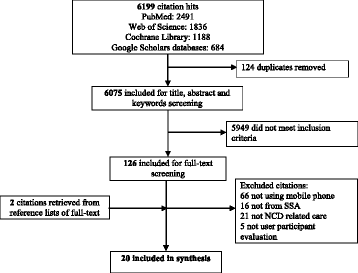A realist review of mobile phone-based health interventions for non-communicable disease management in sub-Saharan Africa
- PMID: 28162090
- PMCID: PMC5292812
- DOI: 10.1186/s12916-017-0782-z
A realist review of mobile phone-based health interventions for non-communicable disease management in sub-Saharan Africa
Abstract
Background: The prevalence of non-communicable diseases (NCDs) is increasing in sub-Saharan Africa. At the same time, the use of mobile phones is rising, expanding the opportunities for the implementation of mobile phone-based health (mHealth) interventions. This review aims to understand how, why, for whom, and in what circumstances mHealth interventions against NCDs improve treatment and care in sub-Saharan Africa.
Methods: Four main databases (PubMed, Cochrane Library, Web of Science, and Google Scholar) and references of included articles were searched for studies reporting effects of mHealth interventions on patients with NCDs in sub-Saharan Africa. All studies published up until May 2015 were included in the review. Following a realist review approach, middle-range theories were identified and integrated into a Framework for Understanding the Contribution of mHealth Interventions to Improved Access to Care for patients with NCDs in sub-Saharan Africa. The main indicators of the framework consist of predisposing characteristics, needs, enabling resources, perceived usefulness, and perceived ease of use. Studies were analyzed in depth to populate the framework.
Results: The search identified 6137 titles for screening, of which 20 were retained for the realist synthesis. The contribution of mHealth interventions to improved treatment and care is that they facilitate (remote) access to previously unavailable (specialized) services. Three contextual factors (predisposing characteristics, needs, and enabling resources) influence if patients and providers believe that mHealth interventions are useful and easy to use. Only if they believe mHealth to be useful and easy to use, will mHealth ultimately contribute to improved access to care. The analysis of included studies showed that the most important predisposing characteristics are a positive attitude and a common language of communication. The most relevant needs are a high burden of disease and a lack of capacity of first-contact providers. Essential enabling resources are the availability of a stable communications network, accessible maintenance services, and regulatory policies.
Conclusions: Policy makers and program managers should consider predisposing characteristics and needs of patients and providers as well as the necessary enabling resources prior to the introduction of an mHealth intervention. Researchers would benefit from placing greater attention on the context in which mHealth interventions are being implemented instead of focusing (too strongly) on the technical aspects of these interventions.
Keywords: Chronic diseases; Health policy; Mobile phone; Non-communicable diseases; Realist review; Sub-Saharan Africa; mHealth.
Figures
References
-
- Institute for Health Metrics and Evaluation HDN, The World Bank . The global burden of disease: generating evidence, guiding policy — sub-Saharan Africa regional edition. Seattle, WA: IHME; 2013.
-
- Sambo LG. Health systems and primary health care in the African region. Afr Health Monit. 2011;(Special Issue 14):2–3.
-
- Patrick Gold O, Ufuoma JE. Accelerating empowerment for sustainable development: the need for health systems strengthening in sub-Saharan Africa. Am J Public Health Res. 2013;1(7):152–8. doi: 10.12691/ajphr-1-7-2. - DOI
Publication types
MeSH terms
LinkOut - more resources
Full Text Sources
Other Literature Sources
Medical



